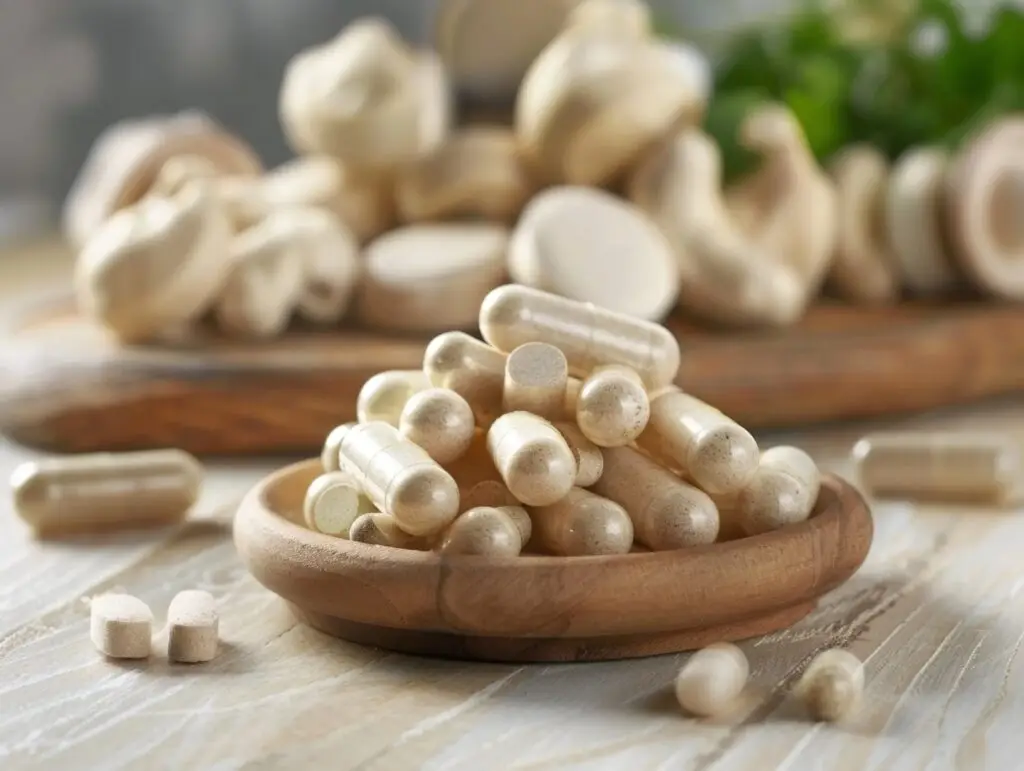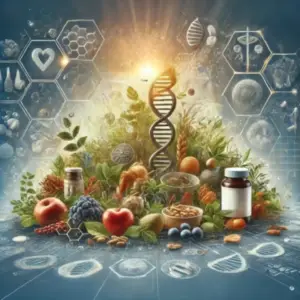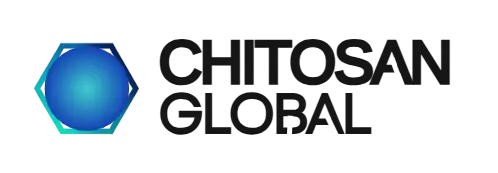
Chitosan: The Versatile Natural Compound for Weight Management, Gut Health and Detoxification.
The benefits of mushroom chitosan in dietary supplements
Mushroom chitosan, a fungal-derived alternative to traditional shellfish chitosan, offers a range of benefits and functions as a dietary supplement. Here are the details:
Applications in Dietary Supplements:
- Active Ingredient: Chitosan is used as the primary active ingredient in weight loss and cholesterol management supplements. (Current manufacturers of weight management supplements sell only shellfish-derived chitosan – until now! Shield Nutraceuticals now sells Pure Mushroom Chitosan capsules.)
- Fiber Supplement: Serves as a source of dietary fiber.
- Toxin Binder: Mushroom chitosan is used for its ability to bind to and help remove toxins from the body. This property makes it valuable in various health and environmental applications. Here’s a more detailed explanation:
- Toxin Binding Mechanism:
- Chitosan oligosaccharide has a positively charged amino group that can attract and bind to negatively charged toxins, heavy metals, and other harmful substances.
- Its molecular structure allows it to form complexes with these toxins, effectively trapping them.
- Applications in Detoxification:
- Heavy Metal Removal: It can bind to heavy metals like lead, mercury, and cadmium, helping to remove them from the body.
- Cholesterol Reduction: Some studies suggest it can bind to dietary fats and cholesterol, potentially aiding in their excretion. Here is an example of such a study:
- Mycotoxin Binding: It has shown potential in binding to certain mycotoxins, which are toxic compounds produced by fungi.
- Advantages:
- Biocompatibility: Generally considered safe for human use.
- Biodegradability: Environmentally friendly as it breaks down naturally.
- Non-toxic: Unlike some other detoxifying agents, it’s not harmful to the body.
- Considerations:
- Effectiveness can vary depending on the specific toxin and environmental conditions.
- The degree of deacetylation and molecular weight of the chitosan oligosaccharide can affect its binding capacity.
- Toxin Binding Mechanism:
Mushroom Chitosan as a Dietary Supplement:
- Fat Binding and Weight Management: Positively Charged chitosan can bind to dietary fats in the digestive system, potentially reducing their absorption and aiding in weight management.

- Detoxification: Mushroom Chitosan can help to remove heavy metals and toxins from the body due to its high positive charge.
- Gut Health Promotion: Chitosan acts as a prebiotic dietary fiber, promoting gut flora balance. It feeds healthy bacteria, thereby supporting the microbiome.

- Blood Sugar Regulation: Chitosan has been shown to assist in stabilizing blood sugar levels, beneficial for those with diabetes or insulin resistance.
Here is an article snippet on this topic:
Chitosan modifies glycemic levels in people with metabolic syndrome and related disorders: meta-analysis with trial sequential analysis
-
Nutrition Journal volume 19, Article number: 130 (2020) Cite this article
Abstract Background
Chitosan supplementation has been shown to modulate glycemic levels; however, studies have reported conflicting results. The present meta-analysis with trial sequential analysis was conducted to verify the overall influence of chitosan on glycemic levels in patients with metabolic syndrome.
Methods
The PubMed, Cochrane library, and EMBASE databases were systematically searched for randomized controlled studies of chitosan intake and glycemic levels.
Results
A total of ten clinical trials including 1473 subjects were included in this meta-analysis. Pooled effect sizes were determined by random-effects meta-analysis. Subgroup analysis was performed to analyze the sources of heterogeneity and their influence on the overall results. The results revealed a significant reduction in fasting glucose levels (SMD: − 0.39 mmol/L, 95% CI: − 0.62 to − 0.16) and hemoglobin A1c (HbA1c) levels (SMD: -1.10; 95% CI: − 2.15 to − 0.06) following chitosan supplementation but no effect on insulin levels (SMD: − 0.20 pmol/L, 95% CI: − 0.64 to 0.24). Subgroup analyses further demonstrated significant reductions in fasting glucose levels in subjects administered 1.6–3 g of chitosan per day and in studies longer than 13 weeks. Trial sequential analysis of the pooled results of the hypoglycemic effect demonstrated that the cumulative Z-curve crossed both the conventional boundary and trial sequential monitoring boundary for glucose and HbA1c.
Conclusions
The glucose level of patients who are diabetic and obese/overweight can be improved by supplementation with chitosan for at least 13 weeks at 1.6–3 g per day. Additional clinical research data are needed to confirm the role of chitosan, particularly in regulating glycosylated hemoglobin and insulin.
-
Detoxification: Chitosan can bind to toxins and heavy metals, facilitating their excretion from the body.

Immune Support: Evidence suggests that it can boost the immune system.

Bone Health: Aids in calcium absorption which can improve bone strength.

Antioxidant Effects: Possesses antioxidant properties, combating oxidative stress in the body.
What are some applications of mushroom chitosan in dietary supplements?

Applications in Dietary Supplements:
- Active Ingredient: Chitosan oligosaccharide, with a degree of deacetylation of approximately 98% and a molecular weight of 3 kDa, is used as the primary active ingredient in our weight management and cholesterol management supplement. (The problem is that the current manufacturers of weight management supplements sell only shellfish-derived chitosan. Until now! Shield Nutraceuticals now sells Pure Mushroom Chitosan capsules.) Here is an article to view on this topic: https://pubmed.ncbi.nlm.nih.gov/11838268/
- Fiber Supplement: Serves as a source of dietary fiber. Also considered a prebiotic fiber. It feeds beneficial bacteria in the gut.
- Toxin Binder: Mushroom chitosan is used for its ability to bind to and help remove toxins from the body. This property makes it valuable in various health and environmental applications. Here’s a more detailed explanation:
- Toxin Binding Mechanism:
- Chitosan oligosaccharide has a positively charged amino group that can attract and bind to negatively charged toxins, heavy metals, and other harmful substances.
- Its molecular structure allows it to form complexes with these toxins, effectively trapping them.
- Applications in Detoxification:
- Heavy Metal Removal: It can bind to heavy metals like lead, mercury, and cadmium, helping to remove them from the body.
- Cholesterol Reduction: Some studies suggest it can bind to dietary fats and cholesterol, potentially aiding in their excretion. Here is an example of such a study:
- Mycotoxin Binding: It has shown potential in binding to certain mycotoxins, which are toxic compounds produced by fungi.
- Advantages:
- Biocompatibility: Generally considered safe for human use.
- Biodegradability: Environmentally friendly as it breaks down naturally.
- Non-toxic: Unlike some other detoxifying agents, it’s not harmful to the body.
- Considerations:
- Effectiveness can vary depending on the specific application requirements.
- The degree of deacetylation and molecular weight of the chitosan oligosaccharide can affect its binding capacity.
- Toxin Binding Mechanism:
What are the recommended dosages of mushroom chitosan in dietary / food supplement formulas?

Recommended Dosage:
- The optimal dosage of mushroom chitosan in dietary supplements varies based on the intended use and individual health needs.
- For Weight Management and Cholesterol Reduction: Doses typically range from 500 to 3000 mg per day. There is a recommendation in the literature that taking 1500 mg before the two big meals of the day was the most beneficial dosage. Here is an article which discusses this in greater detail:
- As a Fiber Supplement: Dosage can vary widely but should be balanced with adequate water intake.
- For Other Health Benefits: Specific dosages may depend on the formulation and concentration of the chitosan in the supplement.
Mushroom chitosan in dietary supplements offers several health benefits, particularly in weight management, cholesterol control, and gut health. The dosage should be tailored to individual needs and health goals, and professional consultation is recommended for personalized advice.
Discussion: Mushroom chitosan in dietary supplement applications
Mushroom chitosan presents a multitude of benefits and functions when included in dietary or food supplements.
Primarily known for its weight management properties, mushroom chitosan has the ability to bind dietary fats in the digestive system, which can help in reducing their absorption and potentially aiding in weight control. But it does more.
It’s also recognized for its role in cholesterol management, as it can bind with cholesterol in the gastrointestinal tract, thus reducing its absorption and potentially lowering overall cholesterol levels. Another significant benefit is its contribution to gut health; acting as a dietary fiber, it can enhance gut flora balance and overall digestive health.

In addition to these attributes, mushroom chitosan also shows promise in blood sugar regulation, making it beneficial for individuals with or at risk of diabetes.
Chitosan’s detoxification properties, wherein it binds to toxins and heavy metals, facilitate their excretion from the body.
It supports bone health by aiding in calcium absorption.
The antioxidant properties of mushroom chitosan contribute to reducing oxidative stress in the body.
Emerging research suggests potential roles in immune system enhancement, offering an allergen-free alternative for those sensitive to shellfish-based chitosan, and exploring its anti-aging effects.
This array of benefits makes mushroom chitosan a versatile and valuable component in dietary supplements, catering to a wide range of health and nutritional needs.
References:
- https://pubmed.ncbi.nlm.nih.gov/11838268/
- https://pubs.rsc.org/en/content/articlehtml/2023/ra/d2ra07112f
- https://www.mdpi.com/1422-0067/23/12/6761
- https://nutritionj.biomedcentral.com/articles/10.1186/s12937-020-00647-4
- https://www.ncbi.nlm.nih.gov/pmc/articles/PMC7709411/
Book a Free Consultation
If you don’t know what type of chitosan is best for your situation, Book an appointment. we will offer you an initial 30-minute consultation and product quotation at no charge.
